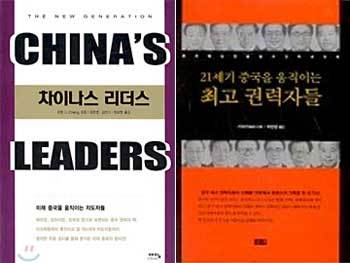Unearthing Chinese Leaders of Next Generation
Unearthing Chinese Leaders of Next Generation
Posted November. 08, 2002 22:56,

Chinese Leaders
Li Ching, translated Kang Jun-young, et al.
pp.360, \12,000, Yeadam
Powerful Men of China in the 21st Century
Gao Shin, translated by Lee Chong-hwan
pp. 472, \25,000, Changhae
The world is paying its attention to who will lead China in the 21st century. It is because, in the 16th National People`s Congress, the new leaders will be selected. CNN has reported that 7 permanent members of the political bureau have already been selected. Under these circumstances, these two books help us look deep inside the core of the Chinese power.
In Chinese Leaders, the author, who is a Chinese-American political scientist, classifies into four categories all the Chinese leaders ever since the establishment of China, and describes the characteristics and features of each category. What attracts the book lies in the analysis of the personal relationships, which are likely to be overlooked in official documents.
The author defines as the "Generation of Cultural Revolution" those who will take charge of China after the 16th Congress. According to the author`s analysis, they were in high school or college when the Cultural Revolution was in progress. Undergoing the experience as the Red army, they have developed very unique values and bonds between them. These leaders, however, are those in power who, after Dung Shaoping took the power, began to lead China, armed with technology and science as well as ideology.
One of the institutes that have produced these leaders is Chinghwa University, which is called a "MIT in China." The book describes in detail the profiles and credentials of the leaders classified as the 4th generation, and predicts their impacts on the Chinese politics. It also introduces to us the detailed personal history of Hu Zintao, who is the successor to Jiang Zemin, one of the most prominent alumni of Chinghwa Univ.
Powerful Men of China in the 21st Century introduces to us the 79 most powerful top brass of the Chinese communist party in terms of their positions and statuses in hierarchy. It could even serve as a handy reference book with its detailed description of a figure as to, for example, background, achievement and evaluation. With regard to Hu Zintao, the book stresses, Dung Shaoping picked Hu himself in preparation for the post-Jiang era. But Hu himself has already gained the confidence of Jiang. Naturally, he is bright and open-minded. The author of Powerful Men of China in the 21st Century was imprisoned in 1989 for his involvement in the democratic movement on the Tiannamen Square. After released from prison, he went over to the United States and has become a journalist specialized in China.
Yoon-Jong Yoo gustav@donga.com
Headline News
- Joint investigation headquarters asks Yoon to appear at the investigation office
- KDIC colonel: Cable ties and hoods to control NEC staff were prepared
- Results of real estate development diverged by accessibility to Gangnam
- New budget proposal reflecting Trump’s demand rejected
- Son Heung-min scores winning corner kick







